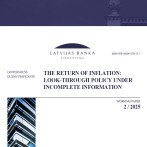As consumer optimism grows, inflation remains low
The annual inflation in Latvia remained low in December at 1.6%. Month-on-month, the average consumer price level did not change.
In the direction of growth it was influenced by a rise in unprocessed foodstuff prices, as well as raised fuel prices in Latvia (despite a fall in the exchange of the US dollar and the global prices of oil products were stable).
In some municipalities, the prices of thermal energy rose (e.g., in Ventspils, where it is not determined by the price of natural gas). Under the impact of the holiday season, some unregulated services (primarily catering and hotel services) appreciated slightly, but overall the prices of services were stable. The service providers (unlike the trade branch) apparently were still cautious regarding the improved consumer confidence in December. The non-food prices brought down the monthly inflation, including footwear prices, which, as the seasonal sales began, dropped 5.3% already in December.
The pressure of supply side factors on inflation does not increase in Latvia: the rather stable global oil and food prices do not provoke a domestic rise in prices, and the previous months’ oil product price level has had a beneficial effect on the 9-month average mazout price on which natural gas tariffs depend in Latvia. In the forecasts of January and February prices published by AS "Latvijas Gāze" in December a slight drop in the natural gas tariffs for all groups of consumers is envisioned and it will have a favourable effect on the cost dynamics of the producers of thermal energy and other industries in the coming months. January sees an activation in seasonal sales which in the near future will have a favourable effect on the price level of non-food items. At the beginning of January, there are important sales of items that the sellers have bought in quantities for the holiday season.
The average annual inflation in 2012 was at 2.3%, and the year-on-year drop was primarily determined by supply-side factors whereas any demand side impact was still limited by a balanced wage and productivity developments. In 2013, the average annual inflation level could be even slightly lower than in 2012, in part because of base factors and in part because of the expected slightly slower economic growth.
In the medium term, economic growth and a gradual increase in purchasing power could renew the impact of demand on inflation and that will determine further convergence of the price level to the European Union average; the inflation level will therefore slightly exceed that observed in countries with a higher level of income. Yet there are no economic preconditions for a rapid and growth inhibiting rise in inflation and that is determined by a more balanced economic development.
Textual error
«… …»






